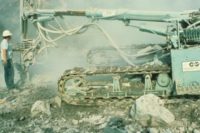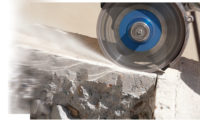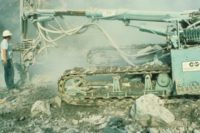Silica rule delayed for 30 days

A move last week by the U.S. Department of Labor (DOL) will delay enforcement of OSHA’s silica rule for the construction industry for another 30 days – to Oct. 23. The DOL said the delay was necessary because of the “dramatic” reduction in the exposure limit – from 250 to 50 micrograms per cubic meter of air, averaged over an eight-hour shift. Safety advocates charge that pushing back enforcement will result in more worker fatalities and illnesses.
2.3 million workers
OSHA issued its final rule protect to protect workers from exposure to respirable crystalline silica in an effort to reduce rates of lung cancer, silicosis, chronic obstructive pulmonary disease and kidney disease among the 2.3 million workers are exposed to respirable crystalline silica in their workplaces. Exposure often occurs as workers drill, cut, crush, or grind silica-containing materials such as concrete and stone, and engage in brick manufacturing and hydraulic fracturing, also known as fracking.
Although the hazards of respirable crystalline silica have been recognized since the 1930s, it wasn’t until 1971, when OSHA was created, that standards to limit worker exposure were issued. The agency says the standards are now outdated and do not adequately protect workers from silica-related diseases. Furthermore, workers are being exposed to silica in new industries such as stone or artificial stone countertop fabrication and hydraulic fracturing.
Court battle
Industry groups and labor unions are squaring off in court over the silica rule, testifying in a lawsuit filed by Associated General Contractors, which says the rule is costly and unnecessary. Labor unions contend that the rule doesn’t go far enough in protecting workers.
When enforcement does begin, OSHA will – during the first 30 days of enforcement - evaluate good faith efforts to meet the new standard and “render compliance assistance and outreach to assure that covered employers are fully and properly complying with its requirements,” said Thomas Galassi, Acting Deputy Assistant Secretary of OSHA.
Looking for a reprint of this article?
From high-res PDFs to custom plaques, order your copy today!







.jpg?t=1721257160)
